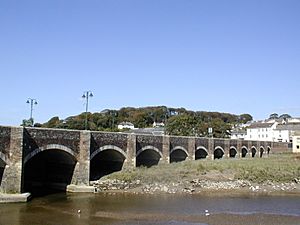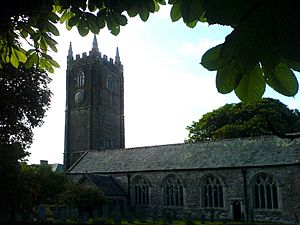Egloshayle facts for kids
Quick facts for kids Egloshayle
|
|
|---|---|
 The Old Bridge at Wadebridge |
|
| Lua error in Module:Location_map at line 530: Unable to find the specified location map definition: "Module:Location map/data/Cornwall (mainland)" does not exist. | |
| Population | 406 (United Kingdom Census 2011) |
| OS grid reference | SX001719 |
| Civil parish |
|
| Unitary authority | |
| Ceremonial county | |
| Region | |
| Country | England |
| Sovereign state | United Kingdom |
| Post town | WADEBRIDGE |
| Postcode district | PL27 |
| Dialling code | 01208 |
| Police | Devon and Cornwall |
| Fire | Cornwall |
| Ambulance | South Western |
| EU Parliament | South West England |
| UK Parliament |
|
Egloshayle (pronounced "eglos-hale") is a small village and civil parish in northern Cornwall, England. Its name comes from the Cornish words eglos (meaning church) and heyl (meaning estuary). The village sits right next to the River Camel, just southeast of Wadebridge. The parish of Egloshayle also includes the smaller areas of Washaway and Sladesbridge.
Contents
History of Egloshayle
Egloshayle has a long history, dating back to the Bronze Age. It was once a busy river port, even competing with Padstow, which is about 5 miles downriver. People traded things like tin, clay, wool, and different kinds of vegetables here. Today, Egloshayle is mostly a quiet residential area, close to the town of Wadebridge.
Building the Old Bridge
The nearby town of Wadebridge grew out of the parishes of Egloshayle and St Breock. A local church leader from Egloshayle, named Thomas Lovibond, was important in building the first bridge over the River Camel. This bridge was needed because the old river crossing was very dangerous. Construction started in 1468 and was finished in 1485. Some local historians believe it was completed earlier, around 1475, by a John Lovibond.
The bridge is sometimes incorrectly called the "Bridge on Wool." This is because people used to say its foundations were made of wool sacks. However, the bridge was actually built in the usual way, with its foundations firmly on the riverbed.
Churches in Egloshayle
The main church in the parish is dedicated to St Petroc. It is a very old building, mostly built in the Perpendicular Gothic style, which was popular in the 15th century. Inside, you can see a Norman font (a basin for baptisms) and a stone pulpit from the 1400s. There's also a beautiful memorial to Dame Barbara Molesworth, who passed away in 1735. The church has a set of eight bells, with the largest one weighing over 1,200 pounds!
Washaway Chapel
There is also an Anglican chapel in Washaway, built in 1883. It has a very old font, which is one of the oldest in Cornwall. In 1896, Arthur Langdon noted that there were six old stone crosses in the parish. Two of these are in the parish churchyard, and one is at Washaway. Another cross, called Three-hole Cross, is about 1.5 miles north of Egloshayle at a crossroads.
The Ringers of Egloshayle
The bell-ringers from Egloshayle are famous because they are featured in a song called The Ringers of Egloshayle. This song has been recorded by several artists, including the well-known Cornish singer Brenda Wootton.
Interesting Buildings and Old Sites
Egloshayle has some interesting old buildings. These include Pencarrow House, which was built in the 18th century, and Croan House from the 17th century. Both of these large houses have seven sections, or "bays," in their design.
Kelly Rounds (Castle Killibury)
On the edge of the parish, you can find Kelly Rounds, also known as Castle Killibury. This is an Iron Age fort. Some people connect it to the famous legend of King Arthur. It's a fascinating place to imagine ancient times.
One of the houses along the Egloshayle road, which looks out over the River Camel, is also a Grade 2 listed property, meaning it's historically important.
Cornish Wrestling
Cornish wrestling tournaments have taken place in Egloshayle. These traditional wrestling events were held at a place called Hingham Mill.
Famous People from Egloshayle
Several notable people have connections to Egloshayle. The plant-collecting brothers, William and Thomas Lobb, spent their early lives in the village. They became famous for finding new plants around the world.
Arthur Hamilton Norway (1859–1938) was also born in Egloshayle. He later became the head of the Post Office in Ireland before the First World War. He was also the father of Nevil Shute, who became a very famous novelist.
 | Roy Wilkins |
 | John Lewis |
 | Linda Carol Brown |


